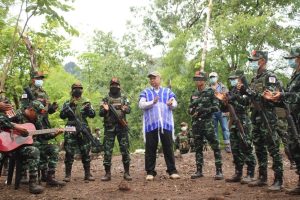Ever since Myanmar’s military seized power and ousted an elected government, international efforts to negotiate a clear way out have focused on dealing with a military that month by month becomes more belligerent, more violent, and less capable.
The assumption was that “the military now controls Myanmar and has all the guns” and that talks – however unpalatable – must proceed. To a large extent, the opposition National Unity Government (NUG) was simply relegated and has struggled to get a hearing on the diplomatic front.
But a briefing paper by the Special Advisory Council for Myanmar (SAC-M) challenges such assumptions and says that the military junta in Myanmar simply does not have effective control of the country to warrant its engagement with the international community.
The paper applied international standards in determining which side in the conflict best meets the criteria used to establish control of a state and found the NUG and resistance groups had “effective control” over 52 percent of the country.
Senior Gen. Min Aung Hlaing and his generals are being actively contested by opposition forces in a further 23 percent of Myanmar and therefore the Tatmadaw, as the military is known, can only claim to have stable control over 17 percent of the country’s territory.
According to the SAC-M, the “trajectory of the conflict favors the resistance, and the junta is losing what control it does have at an increasing rate despite the continued use of mass atrocities by junta forces.”
That correlates with dispatches from inside Myanmar that say independent ethnic-based rebels are increasingly working together and have emerged from the jungles and are taking out military posts in the villages and pushing the fight to the outskirts of provincial cities.
This was a turning point noted at the recent Association of Southeast Asian Nations (ASEAN) Foreign Ministers’ Meeting in Phnom Penh when this year’s host Cambodia admitted negotiations with the junta had failed and the prospect of opening direct talks with NUG became real.
As Bart Edes, a Professor of Practice at McGill University, noted: “ASEAN countries are sensing the weakness behind the regime. They are facing an armed opposition from many different corners within the country. Their status quo can not last.”
This notion is finding much support amid a growing body of evidence that the junta is losing its grip on large parts of the country.
“Armed resistance to the junta has now saturated wide swathes of townships across most states and regions in Myanmar, demonstrating the strength of the population’s rejection of the military playing any further role in the nation’s politics,” the SAC-M added.
Others have noted the world is running out of excuses not to recognize the NUG and the United States is pushing Myanmar up the foreign policy agenda after its plight was raised by President Joe Biden in the United Nations General Assembly last week.
To date, talks with Tatmadaw have proved insipid, at best. And the execution of the four pro-democracy activists on the eve of the ASEAN Foreign Ministers’ Meeting was as tragic as it was stupid and warrants Myanmar’s expulsion, or at least suspension, from ASEAN.
The removal of the Tatmadaw from the negotiating table would enable Indonesia, with backing from Malaysia and Brunei, to deliver on earnest talks with the NUG when Jakarta assumes control of ASEAN’s rotating chair in 2023.
The SAC-M briefing paper also found that the military had forced Myanmar’s former central administration to the brink of collapse, adding the junta is unable to govern and has been reduced to an occupying military force with a diminishing territorial base.
“The world needs to wake up to the reality that a new Myanmar is already taking shape,” Yanghee Lee, a SAC-M founding member, said.
“The NUG is not a shadow government or government in exile. It is the representative of the people’s revolution and resistance to the military junta, the combined of which control the majority of the country,” he added.

































